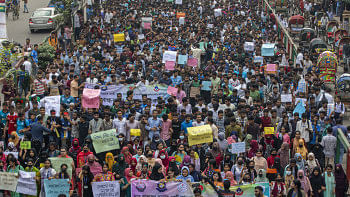A new public university in Dhaka makes little sense

The renewed controversy over the affiliation of seven government colleges with Dhaka University—about eight years after the imposition of that ill-conceived decision—shows the pitfalls of a top-down approach to such critical matters overlooking their complexities. Since the 2017 affiliation, these colleges have had to grapple with significant operational hurdles and academic inequities, a far cry from what was promised initially. Thus, it is understandable that the students now protesting in the streets feel aggrieved, demanding a decoupling from DU.
According to media reports, the students staged sit-ins at several locations in the capital, including Science Laboratory, on Wednesday, leading to widespread traffic congestion across key parts of the city. Many commuters were seen walking to their destinations as traffic from blocked routes spilled over into surrounding areas. The students also held similar demonstrations on Tuesday after a three-day ultimatum issued to the government expired without results. Following Wednesday's blockade, they announced a pause on their protests until Saturday.
However, while the grievances of students are legitimate, their proposed solution and their refusal to call off protests, despite the government's formation of a committee to address these issues, have raised reasonable concerns. This would have been an easier fix if students sought only to break free from DU. But they are also demanding a separate autonomous university for their institutions, having previously rejected the idea of reintegration with the National University that used to oversee these colleges before. Clearly, this is a complex issue that cannot be rushed.
Do we really need another public university in Dhaka? Can we afford it? The founding of an autonomous university requires new legislation, significant land acquisition and infrastructural development, as well as meticulous educational and financial planning. It's an undertaking that may easily span several years—time that the current students do not have.
That said, creating a new public university in the face of ultimatums, and without thorough consideration, would not only be unprecedented but also hugely impactful for an overcrowded city already having multiple public universities (general/specialised). Do we really need another one? Can we afford it? The founding of a new autonomous university requires new legislation, significant land acquisition and infrastructural development, as well as meticulous educational and financial planning. It's an undertaking that may easily span several years—time that the current students do not have.
Therefore, we believe they should reconsider their demand for a new university and instead focus on having their immediate grievances addressed. It is vital that the academic, administrative, logistical and affiliation-related issues plaguing these colleges are resolved, and we hope that the government committee of experts will soon outline a comprehensive plan for solutions. The education adviser has also expressed his commitment to resolving these issues.
So, the right course of action for the protesting students would be to call off their demonstrations, sparing commuters further trouble, and return to their campuses. On their part, the authorities should also ensure proper communication and collaboration with the students to make sure they feel included in decisions regarding their educational life.

 For all latest news, follow The Daily Star's Google News channel.
For all latest news, follow The Daily Star's Google News channel. 










Comments